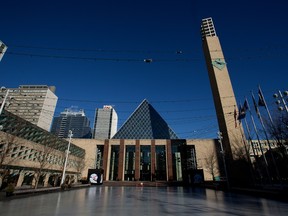“I don’t know how keeping a report private about a violation of the code of conduct increases transparency — it does not,”

Some council members appeared surprised by the changes proposed. Mayor Amarjeet Sohi had some concerns about what was presented — if a councillor is found to have broken the code of conduct the public should know all the facts, he said.
“I don’t know how keeping a report private about a violation of the code of conduct increases transparency — it does not,” the mayor told reporters at a break in the meeting.
“Transparency is very, very important, that as elected officials we are held to a very high standard through the code of conduct … If we are not living up to that standard, I think the public needs to know that.”
That transparency is particularly important to the mayor, he said, because city council could become more partisan with the introduction of political parties. He hopes referring the bylaw back to a special council committee for review will clarify that Edmontonians expect transparency.
“I am also worried that with implementation of Bill 20 that, in the future if we have a party-based system in council, and if a council member of the prevailing party is in violation of the code, then that is kept secret,” he said. “There is a lot of (red) flags around this for me.”
A staff report on council’s agenda said the bylaw updates would have provided “additional procedural clarity to increase transparency” by putting council’s pre-existing sanction hearing process into the bylaw, along with some other changes. It would have made it more clearly council’s decision about whether to make details of misdeeds, and sanction hearings, public or private.
While council gave some “general direction” on how to fill in the gaps, Coun. Ashley Salvador said they were expecting “more of a clean-up” in the bylaw, along with changes recommended taking in the feedback of city administration, the integrity commissioner and council’s ethics advisor.
But Salvador said the result was unexpected. Having council’s code of conduct subcommittee review the changes, she said, will help the bylaw “get to a better place to ensure there is that greater transparency.”
“What they brought forward was that it would start in private, and I don’t think that’s the direction that council wants to go,” she told Postmedia. “I think that we need to hold ourselves to a high standard and high bar, and Edmontonians expect to see those conversations being held in public, especially when it’s about the conduct of their elected representatives.”
Coun. Erin Rutherford, who put forward the motion to send the bylaw for review, told reporters making the findings of the city’s integrity commissioner’s investigation private by default — leaving it up to council to decide whether the report should be public or private — is “a big concern.”
Council’s job isn’t to decide whether there is wrongdoing, Rutherford explained. The city’s integrity commissioner, lawyer Jamie Pytel, only releases a report if she finds through her investigation that a council member, in fact, broke the rules. Currently, those findings are released publicly and council holds a hearing in public to determine what sanctions, if any, should be meted out.
Rutherford said the public has a right to know if council members break the rules, and doing otherwise could worsen distrust from the public.
“Anything that even gives the perception, in my mind, of political interference with the right to information I think is concerning,” she said. “(Distrust), it’s already it’s out there, it’s getting worse with misinformation and disinformation on social media. So … if we don’t provide that information to the public, then the public fills that void with their own information, be it right, wrong or otherwise. And that’s also very dangerous.”
One exception, to her, is protecting the identity of the person who files the complaint if they don’t want that information made public.
Council’s code of conduct subcommittee is expected to review the matter again before the end of September.